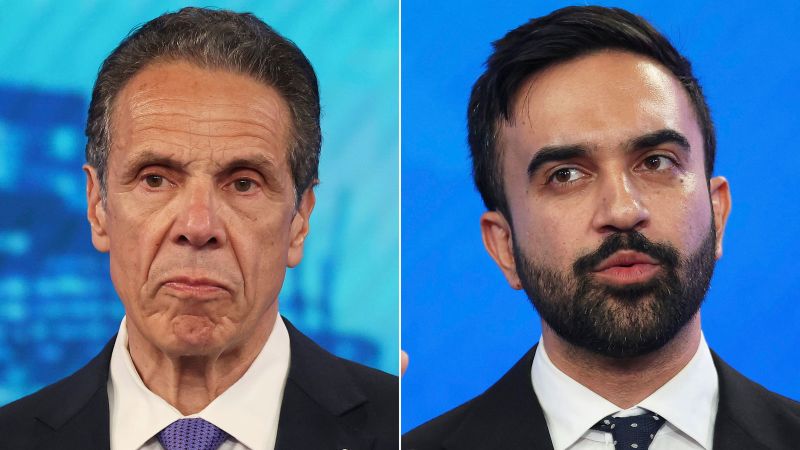In the final debate leading up to New York City’s Democratic mayoral primary, Andrew Cuomo and Zohran Mamdani engaged in a fierce clash that underscored the contrasting perspectives regarding age and experience in the political arena. The encounter revealed much about the candidates’ views of each other, as they grappled over who possesses the qualifications necessary for the mayoral office. With early voting set to commence Saturday ahead of the June 24 primary, the intensity of the debate served as a testament to the competitive nature of the race.
Cuomo, the former governor, attempted to frame Mamdani, a 33-year-old state assemblyman, as dangerously inexperienced, arguing that the iconic role of mayor requires not just youthful energy, but substantial experience negotiating with various levels of government, including city, state, and national legislators. He stressed that the responsibilities of the mayor extend beyond routine governance to include high-stakes scenarios such as responding to natural disasters or dealing with the federal government during contentious times, specifically citing the need for resistance against President Donald Trump and other political pressures.
Mamdani countered Cuomo’s line of attack by pointing to the numerous scandals that tarnished Cuomo’s tenure as governor, including allegations of sexual harassment that led to his resignation in 2021. “I’ve never had to resign in disgrace,” he asserted, highlighting a perceived moral superiority and drawing a stark contrast to Cuomo’s troubled legacy. His assertions included a barrage of accusations that framed Cuomo as an inefficient and unethical leader who had engaged in actions detrimental to New Yorkers.
The exchanges were particularly heated, with Mamdani criticizing Cuomo’s previous handling of crucial public services such as Medicaid and the Metropolitan Transportation Authority. He took direct aim at Cuomo’s character, asserting, “I have never hounded the thirteen women who credibly accused me of sexual harassment.” This direct confrontation not only heightened the drama of the debate but also spoke volumes about the rising tension around personal integrity in politics.
In the midst of these attacks, Cuomo maintained a posture of disbelief regarding Mamdani’s qualifications. He dismissed Mamdani’s experience as minimal, saying, “He’s accomplished nothing,” and argued that such a lack of achievements renders him unfit to lead a complex urban environment like New York City, calling the prospect of Mamdani becoming mayor “laughable” and “dangerous.” This rejection of Mamdani’s capabilities illustrated the larger theme of the debate that age alone does not equate to readiness for political office.
In a broader context, these heated exchanges reflect not only the personal rivalries but also the ideological divides within the city’s Democratic Party. Former New York City Mayor Bill de Blasio commented mid-debate by stating that Cuomo was “REALLY scared” of Mamdani, hinting at the shifting dynamics of power within the party ranks. In a city leaning heavily Democratic, the primary election is often more pivotal than the general election, making the stakes particularly high for both candidates.
Beyond Cuomo and Mamdani, the debate featured other contenders who positioned themselves as alternatives to the front-runners. New York City Council Speaker Adrienne Adams called into question Mamdani’s experience further. She presented her own accomplishments in navigating the city’s budget and leading the council, illustrating the multi-faceted approaches different candidates employ to resonate with Democratic voters. Meanwhile, candidates like Scott Stringer sought to offer a balanced perspective that blended both experience and vision as a means to carve out a distinct path in this crowded field.
This debate also served as a platform for deeper discussions around pressing issues such as police funding and public safety. Questions surrounding how to effectively address crime without compromising the safety and integrity of affected communities were front and center. Cuomo took a confrontational stance, relating to fears voiced by New Yorkers while pointing the finger at his competitors for previously supporting movements to defund the police. In contrast, Mamdani proposed a solution that emphasized integrating more social workers into public safety efforts without eliminating police funding, advocating for a nuanced approach that acknowledges community needs.
In this dialogue, Mamdani’s identity as a member of the Muslim community and his outspoken views on international issues, particularly regarding Israel, also drew scrutiny. Critics questioned his remarks relating to Israel’s actions as “genocide,” arguing that such rhetoric might inflame tensions, while Mamdani maintained that his concerns are shared among many voters and should stimulate constructive dialogue rather than divisiveness.
Overall, the debate was multi-layered, integrating personal attacks, ideological divides, and pressing urban issues, making it a defining moment in New York City’s lead-up to the Democratic primary. As these candidates vie for leadership, their exchanges not only reflect their visions for the city but also encapsulate significant thematic currents shaping the political landscape both locally and nationally.



